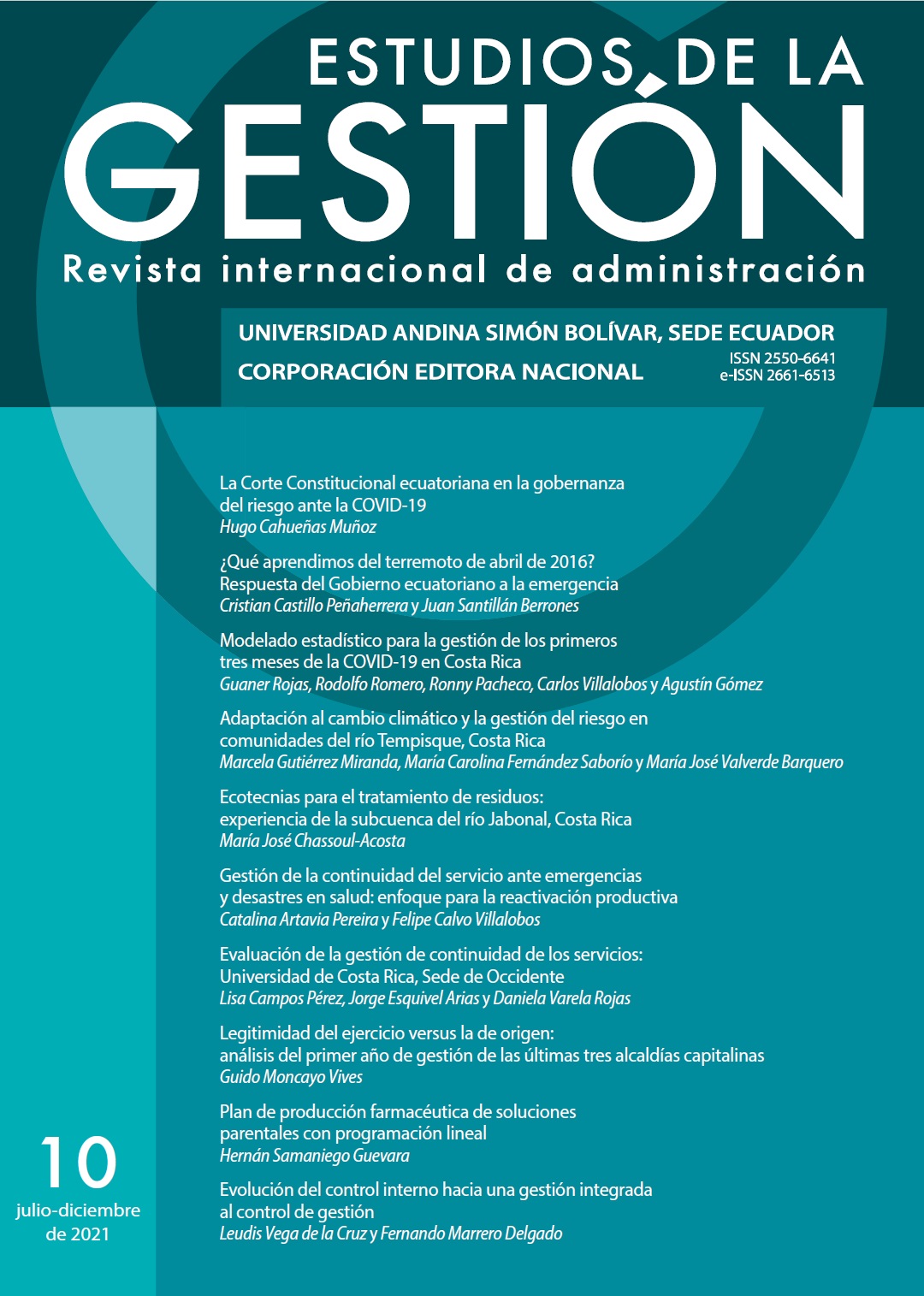Evaluation of Service Continuity Management: University of Costa Rica, Western Headquarters
DOI:
https://doi.org/10.32719/25506641.2021.10.7Keywords:
services, management, risk, public university, organizational cultureAbstract
The University of Costa Rica (UCR) is one of the five public universities of the Republic of Costa Rica, the Western Headquarters (UCR-SO) was the first regional headquarters of the UCR, founded in 1968. In recent years the development of university activities and the use of its facilities have suffered due to different phenomena that have affected the institution. The purpose of the document is to evaluate the development level of the continuity strategies of the UCR-SO, through the analysis of the risk management systems and the essential service continuity of the institution. Under the audit of five international standards and internal factors of the institution which seeks to identify improvement opportunities in relation to the Institutional Continuity of the UCR-SO. Obtaining as a result the little development of the evaluated management systems and the need that the institution features to generate and integrate a model ensuring the timely and quality provision of these services, especially in essential services due to their effect in educa-tional, social and investigative development; as well as in the effective operation of the institution.
JEL: I23 Higher Education andresearch institutions.
Downloads
References
Bloom, Paul, Philip Kotlher y Thomas Hayes. 2004. Marketing de servicios profesionales. Barcelona: Paidós.
Brea, Leydi Mercedez. 2014. Factores determinates del sentido de pertenencia de los estudiantes de arquitectura de la Pontificia Universidad Católica, Madre y Maestra Santo Tomás de Aquino. Murcia: Universidad de Murcia.
Chacón, Gustavo. 2017. Gestión de cambios organizacionales. Caracas: Universidad Católica San Andrés Bello.CR Contraloría General de la República de Costa Rica. 2020. Seguimiento de la gestión para la continuidad de los servicios públicos críticos ante la emergencia sanitaria. San José: CGR.
Espinosa Díaz, Yessica, Claudia Figueroa Rochín, Félix Lizalde Martínez y Jesuán Sepúlveda Rodríguez. 2012. Plan de continuidad académica utilizando tecnologías de información, comunicación y colaboración ante una contingencia en una institución de educación superior. Ciudad de México: Universidad Nacional Autónoma de México.
Fontal Hernández, Rodrigo. 2014. Modelo de gestión integral de emergencias y plan de conti-nuidad del negocio. Palmira: Universidad Nacional de Colombia, Sede Palmira.
INTECO. 2013. INTE 22320: Seguridad de la sociedad. Gestión de emergencias. Requisitos para respuesta ante incidentes. San José: INTECO.
---.2015. INTE/ISO 22301 Seguridad de la sociedad. Sistemas de gestión de continuidad del negocio. Requisitos. San José: INTECO.
---.2016. INTE/ISO TS 22317:2016 Seguridad de la sociedad. Sistema de gestión de conti-nuidad del negocio. Directrices para el análisis de impacto al negocio (BIA). San José: INTECO.
---.2018. INTE/ISO 31000:2018 Gestión del riesgo. Directrices. San José: INTECO.INTECO y CNE. 2014. CNE-NA-INTE-DN-01 Norma de planes de preparativos y respuesta ante emergencias para centros laborales o de ocupación pública. Requisitos. San José: INTECO.
Programa de las Naciones Unidas (PNUD). 2012. Conceptos generales sobre la gestión de riesgos. Santiago: PNUD.
Robbins, Stephen P., y Timothy A. Judge. 2013. Comportamiento organizacional. Ciudad de México: Pearson.
Solano, Verónica Groskieta. s. f. “Programas de refuerzo de las habilidades sociales”. Escuela Nicasio Landa. Accedido diciembre de 2020. https://bit.ly/30bsiwR.
Universidad de Costa Rica (UCR). 2018. Plan de emergencias de la UCR-SO 2018-2019. San Ramón: UCR.
---.2019. “Sedes y recintos”. Universidad de Costa Rica. Accedido septiembre de 2020. http://bit.ly/373lwht.
Unión General de Trabajadores. 2020. Prevenciones de riesgos laborales. Barcelona: Arco Libros. https://https://bit.ly/3kRrDJN.












